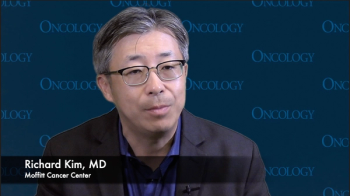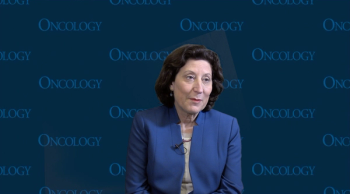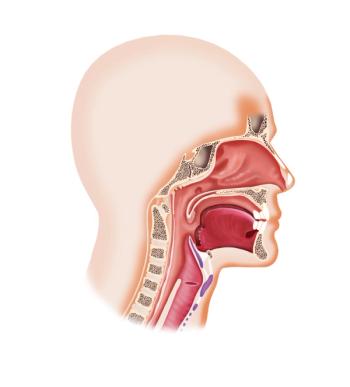
Treatment with the oral VEGFR2 inhibitor rivoceranib appears to induce responses in recurrent or metastatic adenoid cystic carcinoma.

Your AI-Trained Oncology Knowledge Connection!


Treatment with the oral VEGFR2 inhibitor rivoceranib appears to induce responses in recurrent or metastatic adenoid cystic carcinoma.

During the 2022 American Society of Clinical Oncology Annual Meeting, Richard Kim, MD, discusses the rationale for the phase 1b KEYNOTE-651 trial examining pembrolizumab plus chemotherapy in metastatic colorectal cancer.

Results from the phase 2 CRESTONE trial showed positive overall response rates in patients with solid tumors harboring NRG1 fusions treated with seribantumab monotherapy.

Results of the CHOICE-01 trial demonstrate the utility of toripalimab added to chemotherapy in advanced frontline non–small cell lung cancer at 2022 ASCO.

Findings from the phase 3 ASCEMBL trial indicated that asciminib as a treatment for chronic myelogenous leukemia in chronic phase could represent a new standard of care.

Hope S. Rugo, MD, spoke about results of the phase 3 TROPiCS-02 trial examining sacituzumab govitecan vs physicians’ choice chemotherapy for patients with hormone receptor–positive, HER2-negative advanced breast cancer presented at ASCO 2022.

Patients with very high-risk renal cell carcinoma experienced a notable relapse-free survival benefit vs placebo following treatment with everolimus.

FoundationOne CDx has been approved by the FDA as a companion diagnostic for entrecitinib for the treatment of ROS1 fusion–positive non–small cell cancer or NTRK fusion–positive solid cancers.

The radiotherapy schedules used in the ATLAS trial reflect recent evidence and guideline changes for its usage in patients with high-risk localized or locally advanced prostate cancer.

The GARNET trial expansion cohorts showed durable antitumor activity across multiple populations of patients treated with dostarlimab in advanced endometrial cancer.

The phase 1/2 KRYSTAL-1 trial showed the use of adagrasib for KRAS G12C mutant-non–small cell lung cancer yielded results of positive intracranial activity and central nervous system penetration.

Biagio Ricciuti, MD, spoke about combination immunotherapy regimens for patients with non–small cell lung cancer who did not respond well to prior treatment.

A phase 1 trial evaluating SOT101 plus or minus pembrolizumab indicates the safety and potential efficacy of the agent for the treatment of advanced solid tumors.

A 100% clinical complete response rate was observed when patients with stage II/III mismatch repair-deficient locally advanced rectal cancer were treated with dostarlimab.

Based on results from the phase 1/2 GO29781 trial, the European Commission has approved mosunetuzumab for adult patients with relapsed/refractory follicular lymphoma.

Results from the phase 3 SPOTLIGHT trial showed 18F-rhPSMA-7.3 increased post-scan disease upstaging in recurrent prostate cancer.

The phase 3 HER2CLIMB-05 trial will investigate tucatinib plus standard of care maintenance in the first-line setting for patients with HER2-positive metastatic breast cancer.

Results from a cohort of the TAPUR study showed that the combination of cobimetinib plus vemurafenib demonstrated antitumor activity among patients with BRAF mutations who are not otherwise eligible for treatment with other FDA-approved therapies.

Patients enrolled on the phase 3 ENGOT-EN5/GOG-3055/SIENDO study with advanced or recurrent endometrial cancer appeared to benefit from treatment with selinexor compared with placebo.

Adding irinotecan to chemotherapy plus panitumumab for treatment of metastatic colorectal cancer did not result in a significant impact on efficacy.

Metastatic progression pattern with darolutamide appears to be unaltered in nonmetastatic castration-resistant prostate cancer, despite the agent resulting in better survival outcomes.

Benefits of larotrectinib in patients with tumors harboring NTRK fusions have been established, with new data showing health-related quality of life benefits with its use.

HPV-targeting immunotherapeutic PDS0101 in combination pembrolizumab may represent a new option for patients with HPV-positive recurrent or metastatic head and neck squamous cell carcinoma.

Without regard for tumor pathology or PD-L1 expression, administering sugemalimab in combination with chemotherapy was superior to chemotherapy alone in treating patients with non–small cell lung cancer.

Patients with non–small cell lung cancer previously treated with multiple lines of therapy may benefit from treatment with patritumab deruxtecan.

Treatment with zanubrutinib and obinutuzumab improved outcomes in patients with relapsed/refractory follicular lymphoma vs obinutuzumab monotherapy.

A post-hoc analysis of the phase 3 TITAN trial revealed potential biomarkers that may predict overall survival in patients with metastatic castration-resistant prostate cancer receiving apalutamide plus androgen deprivation therapy.

Dose reductions of ribociclib administered during the phase 2 MONALEESA-2 trial did not have an impact on overall survival for patients with hormone receptor–positive, HER2-negative advanced breast cancer.

In patients with colorectal cancer and synchronous unresectable metastases, resection of the primary tumor before systemic therapy did not result in an extension of overall survival.

Results from a correlative analysis conducted with 3-years of follow-up showed pembrolizumab monotherapy resulted in the greatest long-term survival benefit in patients with non–small cell lung cancer and a PD-L1 tumor proportion score of 90% or more.